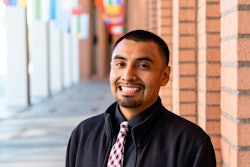Title: Assistant Professor of Higher Education and Student Affairs Administration, University of Vermont
Tenured: No
Age: 34
Education: B.A. in Interdisciplinary Arts from Hampshire College; M.A. in Sociology of Education with a policy concentration; Teachers College Columbia University; and Ph.D. in counseling & human development, University of Georgia
Career mentors: Dr. Darris Means, Clemson University; Dr. Tiffany J. Davis, University of Houston; Dr. McKinley Melton, Rhodes College; Dr. Dominique Baker, University of Delaware; and Dr. Jason Garvey, University of Vermont
Words of wisdom: “Do research and scholarship that you value, that aligns with your vision, and that can be a vehicle for change for the communities, people, and groups you care about most because what’s for you will never miss you.”
Dr. Brittany Williams, an assistant professor of higher education and student affairs administration at the University of Vermont (UVM), always had a knack for Dr. Brittany Williams
Dr. Brittany Williams
While Williams originally anticipated studying law, she instead found herself fulfilled on a college campus. She delighted in academic challenge, but she was also aware that many students from minoritized backgrounds did not feel that same joy and elation in school. As she reflected on the rates of attrition of minoritized students, she also examined her own experiences with racism, sexism, and misogynoir. Williams says she felt a strong sense of responsibility “to make it a better experience, for everyone on campus.”
Williams’s curiosity and quest for knowledge has pushed her beyond the silo of higher education administration into explorations of intersectional disciplines. This ability to expand her learning and her research came to a head when she was just months away from defending her dissertation. Williams had been researching the experiences of Black women in higher education, but after she learned that heterosexual, Black women were the highest rising demographic testing positive for HIV, she knew she had to include that element in her dissertation.
“I did it because of the implications of my scholarship around Black women, girls, my experience with social class and racial identity development,” she says. “I have to think about how they are navigating these structures, what does it mean to overall wellness and the concept of ‘weathering.’”
Although she did not have extensive training in public health, she dove into research, finding books, articles, and speaking circuits to learn more. Now, public health is fully integrated into her research agenda.
Williams credits her ability to pivot, her eagerness to study entirely new subjects, to her attendance at a small liberal arts college for her undergraduate degree—Hampshire College—in Amherst, Massachusetts.
But for Dr. Jason Garvey, executive director of the Office of Institutional Research and Assessment and professor of education at UVM, going above and beyond is characteristic for Williams.
“I’ve learned a lot from her about spanning disciplinary boundaries, which is especially avant garde in the field of education, especially the intersection of public health,” said Garvey. “She entered the academy to have a positive impact on communities she cares about. It’s an ethos built into her bones to transcend those boundaries. And in a restrictive environment like higher education, she demands the environment change.”
Garvey adds that Williams has a remarkable skill when it comes to building community and support, especially in a virtual environment. Williams is responsible for hashtag movements on X, formerly known as Twitter, including #CiteASista and #SisterPhD, which celebrated, acknowledged, and shared the achievements of Black women in academia.
Williams has continued her work in HIV awareness and activism. She’s brought it to social media as well, creating the hashtag movement #IAmHIVPossible to acknowledge that even if one is not HIV positive, there’s always a chance they could acquire it.
Williams has consistently been on the cutting edge of issues before they hit the mainstream. She says this doesn’t happen because she’s special, but because she knows how to look around and ask questions. She gives thanks to her mentors’ guidance.
“My goal is to continue to do research and scholarship that I value, that aligns with my visions and allows me to be a vehicle for groups and communities I love that have been exploited,” says Williams. Her current project, funded by the National Institute of Health, in partnership with UVM’s College of Medicine and College of Nursing and Health Sciences, connects with middle-school-aged girls, particularly immigrant and refugee youth, assisting in their academic achievement and setting them on the path to college. It’s the perfect blend of two of her focuses: public health and the intersection with higher education.
“What’s next for me is envisioning what healthy higher education looks like, and really bringing the academy to the public,” says Williams. “What’s my responsibility, as someone who knows, writes, and does? If my scholarship isn’t reaching [the public], it’s not doing what it needs to do. That’s the meat and potatoes.”




















